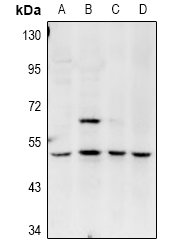Product Name :
BIN1 polyclonal antibody Background :
Bridging integrator 1 (BIN1, AMPHL) is an adaptor protein and putative tumor suppressor expressed as multiple isoforms due to alternative splicing. The BIN1 protein was originally identified as a Myc box-interacting protein with structural similarity to the synaptic vesicle protein amphiphysin. BIN1 protein structure contains an amino-terminal amphipathic helix and a BAR domain that is involved in sensing membrane curvature. The protein also includes a Myc-binding domain and a SH3 domain, which are implicated in protein-protein interactions. Multiple BIN1 isoforms range in size from approximately 45 to 65 kDa, with the nuclear BIN1 isoform found mostly in skeletal muscle and the cytoplasmic IIA isoform expressed in axon initial segments and nodes of Ranvier of the brain. Corresponding BIN1 gene mutations and incorrect splicing can lead to impaired BIN1 membrane-tabulating and protein binding activities, resulting in development of autosomal recessive centronuclear myopathy and myotonic dystrophy. Genome-wide association studies link the BIN1 gene with late onset Alzheimer disease (AD) and increased BIN1 mRNA expression is seen in AD brains. Product :
Rabbit IgG, 1mg/ml in PBS with 0.02% sodium azide, 50% glycerol, pH7.4. Storage&Stability :
Store at 4°C short term. Aliquot and store at -20°C long term. Avoid freeze-thaw cycles. Specificity :
BIN1 polyclonal antibody detects endogenous levels of BIN1 protein. Immunogen :
Synthetic peptide, corresponding to Human BIN1. Conjugate :
Unconjugated Modification :
Unmodification
BIN1 polyclonal antibody Background :
Bridging integrator 1 (BIN1, AMPHL) is an adaptor protein and putative tumor suppressor expressed as multiple isoforms due to alternative splicing. The BIN1 protein was originally identified as a Myc box-interacting protein with structural similarity to the synaptic vesicle protein amphiphysin. BIN1 protein structure contains an amino-terminal amphipathic helix and a BAR domain that is involved in sensing membrane curvature. The protein also includes a Myc-binding domain and a SH3 domain, which are implicated in protein-protein interactions. Multiple BIN1 isoforms range in size from approximately 45 to 65 kDa, with the nuclear BIN1 isoform found mostly in skeletal muscle and the cytoplasmic IIA isoform expressed in axon initial segments and nodes of Ranvier of the brain. Corresponding BIN1 gene mutations and incorrect splicing can lead to impaired BIN1 membrane-tabulating and protein binding activities, resulting in development of autosomal recessive centronuclear myopathy and myotonic dystrophy. Genome-wide association studies link the BIN1 gene with late onset Alzheimer disease (AD) and increased BIN1 mRNA expression is seen in AD brains. Product :
Rabbit IgG, 1mg/ml in PBS with 0.02% sodium azide, 50% glycerol, pH7.4. Storage&Stability :
Store at 4°C short term. Aliquot and store at -20°C long term. Avoid freeze-thaw cycles. Specificity :
BIN1 polyclonal antibody detects endogenous levels of BIN1 protein. Immunogen :
Synthetic peptide, corresponding to Human BIN1. Conjugate :
Unconjugated Modification :
Unmodification
-
 Western blot (WB) analysis of BIN1 polyclonal antibody at 1:500 dilution LaneA:C6 whole cell lysate(40ug) LaneB:MEF whole cell lysate(40ug) LaneC:Hela whole cell lysate(40ug) LaneD:MG63 whole cell lysate(40ug)
Western blot (WB) analysis of BIN1 polyclonal antibody at 1:500 dilution LaneA:C6 whole cell lysate(40ug) LaneB:MEF whole cell lysate(40ug) LaneC:Hela whole cell lysate(40ug) LaneD:MG63 whole cell lysate(40ug)
Bioworld Biotech only provide peptides for our antibodies and do not provide additional peptide customization services.
Price/Size :
USD 368/1mg/vial
Tips:
For phospho antibody, we provide phospho peptide(0.5mg) and non-phospho peptide(0.5mg).Describe :
Blocking peptides are peptides that bind specifically to the target antibody and block antibody binding. These peptide usually contains the epitope recognized by the antibody. Antibodies bound to the blocking peptide no longer bind to the epitope on the target protein. This mechanism is useful when non-specific binding is an issue, for example, in Western blotting (WB) and Immunohistochemistry (IHC). By comparing the staining from the blocked antibody versus the antibody alone, one can see which staining is specific; Specific binding will be absent from the western blot or IHC performed with the neutralized antibody.Formula:
Synthetic peptide was lyophilized with 100% acetonitrile and is supplied as a powder. Reconstitute with 0.1 ml DI water for a final concentration of 10 mg/ml.The purity is >90%,tested by HPLC and MS.
Storage:
The freeze-dried powder is more stable. For short time at 2-8°C. For long term storage store at -20°C.
Note :
This product is for research use only (RUO only). Not for use in diagnostic or therapeutic procedures.
 BIN1 polyclonal antibody
BIN1 polyclonal antibody  Datasheet
Datasheet COA
COA MSDS
MSDS SHIP
SHIP